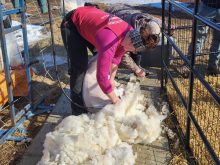LONDON, U.K. – The days following the mad cow scare of 1996 are indelible memories for Ben Gill.
The president of the National Farmers’ Union of Great Britain found himself at the eye of the storm when it was announced March 20, 1996, that scientists suspected a possible link between bovine spongiform encephalopathy and new variant Creutzfeld-Jacob disease in humans.
It was an emotional time with little information for a frightened public.
“There was an absolute vacuum of information,” said Gill, who was deputy NFU president at the time.
Read Also

Charges laid after cattle theft
Saskatchewan RCMP lay two charges against a man after six cattle went missing.
As a farmer spokesperson, he found himself in the centre of a media feeding frenzy and to this day resents government reticence to speak to the public.
The week the story broke, Gill was attending a European Union agricultural meeting in Luxembourg.
At noon, he was checking into his hotel when an official of the ministry of agriculture interrupted him and said they needed to talk.
By 3 p.m. the hotel parking lot was full of reporters and satellite dishes for televised news coverage.
“Somebody recognized me and I was just mobbed. The media thought I was the official spokesman,” said Gill.
The ministry spokespersons stayed away.
Within five hours, Gill gave 55 interviews.
At 5 p.m. on March 25, he was preparing for a television interview when he heard British beef exports were banned.
“It was a defining moment. At that stage we had to accept we couldn’t just stick simply to the science because consumer confidence had been so mortally wounded.”
In the course of his interview, there was a cutaway to a schoolyard where parents were being asked if they would feed beef to their children. The parents said no. They wanted the beef destroyed.
“There is a feeling in society when you have a cancer, you burn it out and they wanted to see the beef destroyed,” he said.
The night of March 25-26, government officials and the NFU cobbled together the “over 30 month scheme” in the farmers’ London union office. It was ready to be presented as legislation March 26.

















